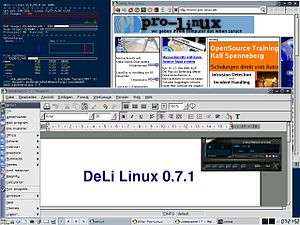DeLi Linux
 DeLi Linux 0.7.1 running Dillo and Abiword | |
| Developer | Henry Jensen |
|---|---|
| OS family | Unix-like |
| Working state | Discontinued |
| Source model | Open source |
| Initial release | September 9, 2004 |
| Latest release | 0.8.0 / May 28, 2008 |
| Package manager | Pacman |
| Kernel type | Monolithic |
| Default user interface | IceWM |
| License | Exclusively free software licenses |
| Official website |
deli |
Desktop Light Linux (DeLi Linux for short) was a desktop Linux distribution for old PCs.
Release history
Until version 0.6.1 DeLi Linux was based on Slackware 7, using Linux 2.2.
DeLi Linux version 0.7 is a development from scratch with Linux 2.4.33.3 and no longer based on Slackware. The OS still used the Slackware package management, additionally there is a new port system based on CRUX. DeLi Linux is now based on uClibc instead of the GNU C Library. A port of OpenBSD's Korn shell is used as the default shell.
Version 0.8 introduced the Pacman package manager, and the 0.8 series will focus on internationalisation. Version 0.8.0 also switched the web browser to NetSurf and Skipstone, having previously been Konqueror Embedded, and Dillo before that.
| Version | Date |
|---|---|
| 0.1 | November 2, 2002 |
| 0.2 | March 19, 2003 |
| 0.3 | July 9, 2003 |
| 0.4 | November 26, 2003 |
| 0.5 | December 16, 2003 |
| 0.6 | June 16, 2004 |
| 0.6.1 | September 9, 2004 |
| 0.7 | 2006-09-15 |
| 0.7.1 | 2006-10-17 |
| 0.7.2 | 2007-05-18 |
| 0.8.0 | 2008-05-28 |
Software
DeLi Linux is pre-packaged with Abiword and Siag Office as the office suites. For the web browser, there are NetSurf and Skipstone. Included email clients are Mutt and Sylpheed. Window managers IceWM and Fluxbox are included. For editing, DeLi Linux offers e3, elvis and Beaver.
Since DeLi Linux ships only lightweight software, many popular open source packages are not included, such as GNOME, KDE, Emacs and Mozilla Thunderbird.
Requirements
DeLi Linux needs a 386 with 32 MB RAM as a minimum. However, a Linux Swap partition needs to be selected during setup to run DeLi with less than 48 MB RAM. It should work smoothly with a 486. A full installation with all packages requires nearly 750 MB of hard disk space.[1][2]
Successor projects
In August 2010, the developers announced that DeLi Linux will be discontinued. Instead there are two successor projects: ConnochaetOS and Deli(cate).[3]
ConnochaetOS was created in 2010 as an Arch Linux derivative targeting i586 (Pentium 1 and later) processors (at the time, Arch required at least i686), and trying to follow the GNU Free System Distribution Guidelines (FSDG).[4] It was discontinued in July 2013, due to the maintainer's lack of time, the project's financial situation, and the project's failure to get an endorsement from the Free Software Foundation as being FSDG-compliant.[5][6][7] However, in June 2015, development of ConnochaetOS resumed, no longer as a derivative of Arch Linux, but as a derivative of Slackware and Salix OS.[8]
Another project is Deli(cate),[9] which runs on 386, 486 and Pentium-class machines.
See also
References
- ↑ Review of DeLi Linux 0.7.2 at Distrowatch
- ↑ Review of DeLi Linux 0.7.1 at linux.com
- ↑ "DeLi revived". Retrieved 2018-04-18.
- ↑ "DeLi Linux becomes ConnochaetOS". ConnochaetOS. Archived from the original on 2010-08-21. Retrieved 2018-04-18.
- ↑ "ConnochaetOS discontinued". ConnochaetOS. 2013-07-21. Archived from the original on 2013-08-27. Retrieved 2018-04-18.
- ↑ "The End - Future developments and recommendations". ConnochaetOS Forum. 2013-07-21. Archived from the original on 2013-10-13. Retrieved 2018-04-18.
- ↑ Shumaker, Luke (2013-11-30). "ConnochaetOS packages are no longer searchable". Parabola GNU/Linux-libre. Retrieved 2018-04-18.
- ↑ "What is ConnochaetOS?". ConnochaetOS. 2015-06-28. Archived from the original on 2015-09-06. Retrieved 2018-04-18.
- ↑
External links
| Wikimedia Commons has media related to DeLi Linux. |